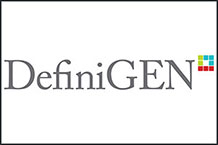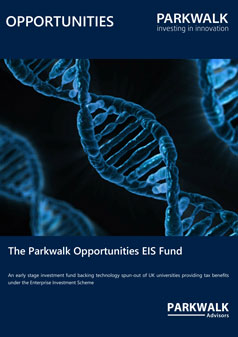|
We are delighted to announce that the Parkwalk Opportunities Fund and the Parkwalk-managed University of Cambridge Enterprise Fund IV has closed an investment in DefiniGEN, a spin-out from...
|
|
|||||
 |
|
|||||
|
Dear , DefiniGEN’s proprietary production platform OptiDIFF robustly generates human cell types including using hIPSC human Induced Pluripotent Stem Cell technology. DefiniGEN has utilised the OptiDIFF platform to produce validated libraries of disease modelled human liver and pancreatic cells for a range of Inherited Metabolic Diseases (IMDs). The phenotype and pathology of the diseases has been confirmed in the cells and the resulting products are available for utilisation in drug discovery lead optimization studies. DefiniGEN aims to become a leader in the supply of human cells of specific organs, derived from stem cells, to the research and pharmaceutical industry, which will enable quicker, more accurate in vitro toxicity testing. This in turn will lead to fewer animal tests in the toxicity field being performed and provide pharmaceutical companies with a quicker and more accurate view on a potential new drug’s effectiveness and toxicity in Humans. This will allow them substantial savings in the development process as they can fail products faster than the current development timelines. The academic founders are Professor Roger Pedersen, Professor Ludovic Vallier, and Dr Tamir Rashid from the University of Cambridge. Professor Pedersen is a world renowned expert in stem cell production and since 2008 he has been the Director of The Anne McLaren Laboratory for Regenerative Medicine, the translational phase of the Cambridge Stem Cell Initiative. Dr Ludovic Vallier is a world class translational academic with particular expertise in the generation of key cell types from hIPSC. He is currently a Professor of Regenerative Medicine & Stem Cells at the University of Cambridge. Ludovic has produced ground breaking advances in disease modelling of commercially significant cell types including hepatocytes – the most common cells in the human liver and those performing most of the liver’s functions. Dr Tamir Rashid is Senior Lecturer at the Centre for Stem Cells & Regenerative Medicine at Kings College London and an international authority on clinical applications of stem cell biology. His clinical and research interests lie within diseases of the liver and his work has been recently recognized by the American Liver Association through the award of their 2011 Fellows prize. The Opportunity The discovery and development of new drugs is a long and expensive process. A new drug can cost in excess of $900m and take 10-15 years to bring to the market. It is also a high risk process and the average programme gets through 10,000 compounds for every drug approved. One of the biggest problems facing the industry is the high attrition rate of drugs during development. When compounds enter the clinical phase, having spent approximately 5 years and $175m in development, there is a 46% chance they will fail to get approved due to toxicity and efficacy issues. This is predominately due to the limitations of many in vitro assay and animal testing regimes undertaken in drug discovery programmes. Currently many in vitro assays use immortalised cell lines that often originate from a well-known tissue type, but have undergone significant mutations to become immortal. This can substantially alter the biology of the cell and must be taken into consideration in any toxicity analysis. In addition animal testing has limited predictive value for human toxicity due to species-specific differences in the mechanisms by which chemicals are absorbed, chemically altered, excreted, or bound to specific molecules within the body. The inability to efficiently identify compounds which are toxic and/or ineffective in humans is believed to cost the pharmaceutical industry around $8bn per annum. Primary human hepatocytes are the universally recognised gold standard cell type used to assess the toxicity of drugs. Unfortunately due to the scarcity of primary cell supply, immortalised cell lines are routinely utilised in in-vitro screening programmes. These cell lines can produce beneficial metabolism data however they have significant limitations in performance. The provision of hIPSC derived hepatocytes displaying the functional characteristics and toxicity profiles of primary cells can enable the improved safety and efficacy prediction of drug candidates in high-performance predictive toxicity screens and ADME Tox studies. Therefore the demand for primary human cells which provide a higher quality basis for assays and other testing in drug development is very significant. DefiniGEN meets this need with its stem cell products. The Market The global market for the treatment of liver disease is expected to increase to over $30bn in 2020 and the market for diabetes treatment is forecast to exceed $150bn by that time. Accordingly major commercial focuses of the company will be in liver and diabetes (pancreatic) metabolic disease modelling. The Vallier group have utilised the OptiDIFF™ platform to demonstrate that a range of inherited liver metabolic diseases can be clinically reproduced in hIPSC derived hepatocyte cells. The optimised cells can be used in drug discovery HTS (High Throughput Screening) regimes to identify good quality leads, reducing the costs of attrition in drug development. The platform technology can also generate hIPSC pancreatic beta cells for use in screens established for the development of type 2 diabetes drugs. Pharmaceutical company diabetes drug pipelines are extensive, and the provision of these cells will significantly assist the development of new treatments for this disease. The liver is the major organ of drug metabolism and as a result the assessment of liver toxicity is a central component of the drug discovery process. Hepatocyte-based drug toxicity testing is estimated to be in excess of $2bn a year globally, and this already existing major market could be substantially increased if pharmaceutical companies had access to high quality human hepatocytes. The global in vitro cell assay market is forecast to exceed $18bn by 2020. Within that the market for liver disease amounts to $193m, for diabetes type 2 it is estimated at $148m and the toxicology assay market is forecast at $668m. Stem cell production is a highly competitive area of science, however to date no other company has commercially produced hIPSC human hepatocyte products or hIPSC generated disease modelled hepatocyte products. Due to its superior function the DefiniGEN hepatocyte product is achieving premium pricing, which, at £720-1,000 per vial, is above forecast and generating an attractive gross margin. Initial revenues commenced during the first year, when the company generated more than £225k orders from a single orphan liver disease model hepatocyte product (A1AT deficiency) and that continues to grow. The company is selling to many of the world’s top ranked pharmaceutical and biotech companies already. DefiniGEN has also developed breakthrough pancreatic products for diabetes drug discovery, which will allow it move into that large market. It also completed two transformative deals: i) an exclusive agreement with Horizon Discovery on CRISPR gene-editing technology and ii) access to 100s of stem cell lines from EBiSC European stem cell bank. These will enable it to bring a much expanded catalogue of products to the market and it plans to introduce 12 new offerings in 2016. The Team Dr Marcus Yeo, CEO, is an experienced life scientist and Company Director. He took the Oxford biotechnology company Cybersense Biosystems to acquisition in 2008 by the FTSE 100 company Severn Trent. Marcus currently works as Commercial Manager for the University of Oxford spin-out company Zyoxel, which markets advanced 3D tissue culture systems for the drug discovery and regenerative medicine sectors. Marcus has significant corporate business development expertise with a particular emphasis on future-proofing technology acquisitions, and ISO17025 quality management experience. Marcus has developed and project managed in excess of £15m of scientific funding and has extensive experience of high technology start-up development. Jonathan Milner, Chairman, is an experienced entrepreneur and business leader with a background in genetic research. He was one of the founders of Abcam in 1998, after identifying the market opportunity for high-quality antibodies in research. His academic work includes a doctorate in Molecular Genetics at Leicester University and post-doctoral research into antibody engineering at Bath University and the BRCA2 gene, associated with hereditary cancer, at the University of Cambridge. Dr Ludovic Vallier, Founder & CSO, is a Professor of Regenerative Medicine based at the Laboratory of Regenerative Medicine Addenbroke’s Hospital. The Vallier laboratory study mechanisms controlling differentiation of pluripotent cells into pancreas and liver cell types. They have advanced the state of the art regarding the use of hIPSC as an in vitro model of development in combination with functional analyses. This has included the development of a platform technology enabling the controlled differentiation of human stem cells into specific endodermal cell types including pancreas and liver progenitors. There is also a particular focus on the use of hIPSCs to model medically significant liver metabolic diseases for drug discovery and regenerative medicine applications. The Investment Case The company has continued to add to its IP and patent portfolio and, through external deals, to its overall product offering. Its commercial progress is encouraging with a broader sales base expected this year and it remains very strongly placed competitively. We believe that the company has created a good basis on which to push forward with the commercialisation of the technology and see its management as well equipped to deliver that growth. |
||
|
|||||
|
||
|
|||||

